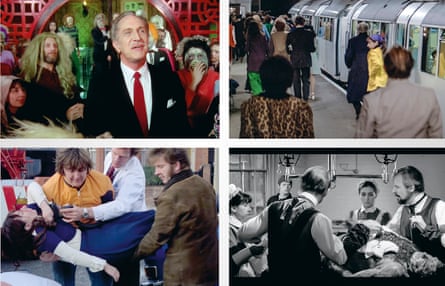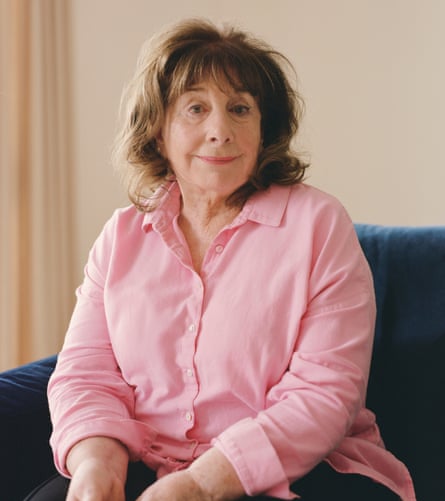Jill Goldston has only recently moved into this airy flat, on the site of the old Teddington television studios in south-west London, but there are already two framed items on prominent display. One is her newly awarded Guinness World Records certificate for “The most appearances by an extra/background actress”. The other is the poster for Jill, Uncredited, the strangely moving documentary short that has brought her into focus at last. “I’ve had an amazing career,” Jill says, as she sits down at the dining room table, to tell her film industry fable over a cup of tea. “Self-indulgent, really – I was getting paid to have fun and I always found the people fascinating.”
Now a vivacious 80-year-old, Goldston was born nearby in 1943, within people-watching distance of Twickenham Studios, the birthplace of British classics such as The Italian Job. She discovered her love of dance aged three, and at 15 ran away from home to join the Butlin’s revue company. “Not because I didn’t like my parents, who I liked very much indeed, but because it was an adventure. So I left them a note and went.” It was at Butlin’s that Jill met her husband, Geoff, with whom she’s recently celebrated a 60th wedding anniversary, although when I congratulate her, Jill says airily, “I think it shows a lack of imagination, actually.” If so, she’s more than compensated for that lack in other areas.
It was from the security of this happily uneventful relationship, for instance, that Jill was able to navigate the excitement of 1960s Soho. “I was [a dancer] at Murray’s with Mandy Rice-Davies when the Profumo affair was going on.” This was the glamorous, star-studded nightspot where a society osteopath met a showgirl, setting in motion events that would eventually help spell the end for Harold Macmillan’s government. “Some of the girls … they had parties at Cliveden [country house] every weekend, but they said, ‘It’s not really for you, Jill.’”
Sixty-year-old scandals aside, these formative experiences taught Goldston two invaluable lessons for a background artist: first, how to keep one’s cool in the presence of movie stars; and second, that it is much more pleasant to spend time in the refracted glow of the limelight than to be directly in its glare. “I had no wish to become famous. I saw people wanting to become famous … It’s not great.” At the suggestion of one of her colleagues from Murray’s, Goldston tried extra work and it suited her. “They warned me: ‘You might get eaten alive, it’s very competitive’. But I found it to be a breeze.”
While filming the 1969 war comedy The Virgin Soldiers she struck up such a good rapport with a fellow extra that he remembered her when they met again, over a decade later, on the set of 1982 TV movie Baal. By this time that extra, David Bowie, had attained top billing. “He came over and said, ‘Weren’t you in Virgin Soldiers?’ We had supper together in the canteen and talked about mundane things.”
Other stars who met with Jill’s approval included ex-Bond Timothy Dalton: “He didn’t get on with his co-star Joanne Whalley, so I had to do the love scenes with him. I used to pray, ‘Please, God, don’t let my hands sweat when he holds them!’” And Michael Caine: “He put his jacket over my head to stop me getting wet in the rain. A true gentleman.” She liked Warren Beatty too, though she says he somehow found the time to proposition her for a three-way with him and Jack Nicholson while producing, directing and also starring in the 1981 film Reds. “It might have ended more than friends. But not with Jack Nicholson as well! I said: ‘Sorry, no. I’m happily married!’”
As Jill grew busier, her husband Geoff, an accountant by training, noted down her gigs in date order, up to that record-breaking 1,951st appearance. This is the list she refers to now to jog her memory on specifics, such as how many Carry On films she worked on (“Oh, about 80%”), the on-set mood during the very first episode of EastEnders (“It was a party scene in the Old Vic and the producer wanted her dog Roly to be in it”). Or the title of her very first gig, a 1963 film called Just for Fun, which might serve as the motto for her entire career.
It was also this husband-compiled list that first attracted the attention of 32-year-old film-maker Anthony Ing. While researching archive footage on another job, Ing found himself idly wondering about the people who appear in the background, at train stations and political rallies, often out of focus, or in a few fleeting frames. Who were they? What were their lives like? Eventually, via a sub-thread titled “Oh, There You Are!” on the online forum Britmovie, he caught wind of Jill’s impressive CV. The two met in person, after which Ing began the painstaking, but also somewhat romantic, process of searching through decades of screen history, hoping for a glimpse of his obsession.
“I went through A Clockwork Orange again and again – like maybe there’s a frame somewhere?” says Ing of his clip-compiling process. “Even though these are such small moments, you do get a sense you know the person. There’s an emotional pull, thinking about her really being there. And then you would see patterns, and be drawn in by those patterns.” It’s this wistful feeling of searching for the narrative of a life in a series of fragmented images – like flicking through photographs of a long-dead grandparent – that Jill, Uncredited captures so well. The resulting film works both as an offbeat biopic and a symbolic tribute to the countless craftspeople who rarely get proper credit for their work.
This aspect is meaningful to Jill, too. “Extras are the lowest and you don’t ever speak to a star unless they speak to you. We’ve been told: ‘Tom Cruise is about to come on set. Please do not make eye contact.’” She has always found the strictly enforced on-set hierarchy more amusing than demeaning. “I had self-worth, because I was part of the film. Films would be very boring without extras. You’d get on the tube train, and there’d be no one else in it!”

Ultimately, being a fake waitress for the day was more fun than being a real waitress every day – and better money, too. She could afford to work only 10 days a month, which must have fitted in well with raising a family? “Oh, I was terrible mother. Absolutely a terrible mother,” she says. “The casting agents used to phone me up and say: ‘How old is your son now?’ I’d say, ‘Well, how old do you want him to be?’”
Her son can’t have felt too resentful about being dragged along to film sets, because he grew up to work in television himself. James Goldston is the Washington DC-based former president of ABC News, and often invites his mother to accompany him to swanky events, such as dinner with the Obamas. “I’m sure I’m one of the only extras that’s ever been to the Oscars,” says Jill with evident maternal pride.
Last year the tables were turned, when she asked James to attend the premiere of Jill, Uncredited, as moral support. “I was terrified. I thought the cinema would be half-empty.” That feeling soon dissipated. “By the time I got to the Berlin film festival, I loved every minute of it!” Nor was the experience of watching 50 years of her life flash by in 18 minutes of screen time quite as uncanny as one might imagine. “But then, I wasn’t watching me. I was watching the people in the background of me. It was like: ‘Oh, there’s so-and-so!’ And it was so lovely to see them all again.”

